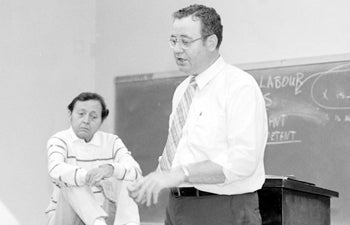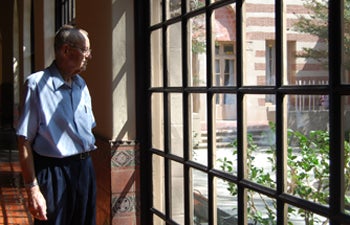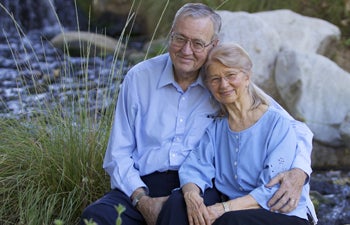In Memoriam: Dallas Willard, 77
Professor Emeritus of Philosophy Dallas Willard, an expert in Christian spiritual formation who taught in USC Dornsife’s School of Philosophy for 47 years, has died. He was 77.
Willard died on May 8 at Kaiser Hospital in Woodland Hills, Calif., a few days after publicly announcing he had stage four cancer.
“Beloved by decades of undergraduates, Dallas was one of the most popular, versatile and dedicated teachers the School of Philosophy has ever known,” said Scott Soames, Distinguished Professor of Philosophy and philosophy director.
“He was a pillar of our undergraduate program,” he said of Willard, a USC Dornsife Faculty Fellow who served as philosophy director from 1982 to 1985.
Varun Soni, dean of the USC Office of Religious Life called Willard an icon for Christian scholars around the world. He remembered Willard as a caring professor to all of his students, noting that USC has more than 40 Christian student groups.
“Dallas was really a hero to many of our Christian students,” Soni said. “He was the ultimate scholar-practitioner. He bridged the divide between philosophy and theology and showed us all how to bring together our spiritual and scholarly lives in a meaningful way.
“He also challenged us to think deeply about the knowledge basis for our faith traditions and he was a generous mentor to our chaplains and our student religious leaders. He will be deeply missed on our campus.”

Dallas Willard (right), professor of emeritus of philosophy, teaches inside his classroom in 1988, with Professor of Economics John Elliott, who taught at USC Dornsife for nearly five decades and died in 2001. Photo by Irene Fertik.
Born in Buffalo, Mo., in 1935, Willard studied at William Jewell College in Liberty, Mo., and earned a bachelor’s in psychology in 1956 from Tennessee Temple College in Chattanooga, Tenn., where he met his wife, Jane, whom he married in 1955. He earned a bachelor’s in philosophy and religion from Baylor University in Waco, Texas, in 1957 and went on to graduate school at the University of Wisconsin-Madison in Madison, Wis., where in 1964 he earned a Ph.D. in philosophy with a minor in the history of science.
A devout Christian, he was ordained a Southern Baptist minister but left the ministry for academia in the early 1960s. He later told Christianity Today he made this decision because he felt God say, “If you stay in the churches, the university will be closed to you, but if you stay in the university, the churches will be open to you.”
After teaching at the University of Wisconsin-Madison from 1960 to 1965, he moved his family to Southern California, joining USC Dornsife in 1965.
Willard studied metaphysics, contemporary European philosophy, ethics and the history of ethics, with a particular emphasis on the status of moral knowledge in contemporary society. His research specialties included systematic metaphysics; ontology of concepts, language, and thought; phenomenology; the history of ethics and philosophy of religion.
He was an expert on influential 20th century German philosopher Edmund Husserl, the principal founder of phenomenology, and published two books of translations of Husserl’s works — Early Writings in the Philosophy of Logic and Mathematics (Springer, 1993) and Philosophy of Arithmetic (Springer, 2003) — while also translating a large number of shorter pieces.
Willard authored more than 200 published articles, 23 critical reviews and 22 forewords. His monograph Logic and the Objectivity of Knowledge was published in 1984, after which it was reviewed in Philosophical Review, Husserl Studies, Philosophy and Phenomenological Research, Review of Metaphysics, and Journal of the British Society for Phenomenology.
In the last few years of his life he was working on a new book, The Disappearance of Moral Knowledge, in which he argued that a striking change in the conception of morality and its role in universities and other leading social institutions took place in the 20th century.
Soames described Willard as “for many years, the teacher with the greatest range in the School of Philosophy,” noting that he regularly taught courses in logic, metaphysics, ethics, aesthetics, history of ethics, philosophy of religion, and the history of philosophy from the 17th to the 20th century.
Willard’s dedication to his teaching, his colleagues and his students was legendary.

In August 2012, Professor Emeritus of Philosophy Dallas Willard gazes through a window at Mudd Hall of Philosophy to a sunlit garden beyond. It was his last day at USC Dornsife where he had taught for 47 years. Photo by Becky Willard Heatley.
“Dallas regularly volunteered to teach overloads when the department needed extra courses,” Soames noted. “When looked at from the perspective of his 47 years at USC, his graduate teaching was also exemplary.”
A frequent member of dissertation committees for Ph.D. candidates in other departments, he chaired 31 successful USC dissertations in philosophy, the latest in 2007.
Two of Willard’s most recent courses, designed and introduced by him in the last decade, became cornerstones of the interdisciplinary philosophy, politics, and law major.
“Reasoning and Logic” introduces students to symbolic logic while stressing the importance of the intellectual virtues of accuracy, objectivity, and disciplined reasoning for their daily lives. “The Professions and the Public Interest in American Life,” studies the roles of professionals of various sorts in our society, the forces that shape them and the foundations of professional ethics.
“Dallas Willard had an encyclopedic mind and numerous students told me that they left his classes in awe of his wide-ranging knowledge of the history of philosophy and ethics,” said Donald Miller, Leonard K. Firestone Professor of Religion and professor of religion and sociology.
“He was also a committed Christian and wrote and lectured extensively on spirituality — a very different topic from his specialized research on the philosopher Edmund Husserl,” said Miller, director of the Center for Religion and Civic Culture in USC Dornsife.
“Dallas Willard is sometime referred to by Evangelical Christians as a contemporary C.S. Lewis.”

Dallas Willard pictured with his wife, Jane Lakes Willard, in September 2010 at Oak Canyon Community Park in Oak Park, Calif. The couple married in 1955. Photo by Dieter Zander of Dieter Zander Photography.
Willard was an award-winning writer on religion. Among his best known works inspired by his Christian faith were The Spirit of the Disciplines: Understanding How God Changes Lives (HarperCollins 1988), The Divine Conspiracy: Rediscovering our Hidden Life in God (HarperOne, 1998), and Renovation of the Heart: Putting on the Character of Christ (NavPress, 2002). He was also active in the Renovaré movement and co-edited the The Renovaré Spiritual Formation Study Bible (HarperSanFrancisco, 2005).
“He taught us that each one of us is an ‘unceasing spiritual being with an eternal destiny in God’s great universe,’ ” Willard’s family wrote in a tribute. “It is evident that he lived from that perspective when we read the correspondence from students and colleagues over the years who reflect on his kindness, respectfulness and genuine concern for them.”
Willard was honored with several awards for teaching during his career at USC, including the USC Student Senate Award for Outstanding Faculty of the Year in 1984 and the USC Associates Award For Excellence In Teaching in 1976. Also in that year he received the Blue Key National Honor Fraternity’s Outstanding Faculty Member award for outstanding contributions to student life at USC.
“Like so many, I will miss him greatly,” Soames said. “Since my arrival at USC, his kindness, his sincerely, his generosity, and his dedication to our common life as teachers and scholars has been a powerful inspiration to me. He made the people around him better. As I once told him, I have never in my career encountered his like. We won’t forget him.”
Willard is survived by his wife, Jane Lakes Willard; his son, John Willard; his daughter, Becky Heatley; his son-in-law Bill Heatley; and his granddaughter, Larissa Heatley.
A memorial service to celebrate Dallas Willard’s life and work will be held on Saturday, May 25, at 10:30 a.m. at the Church on the Way, 14300 Sherman Way, Van Nuys, Calif. There will be a live webcast of the service from the Church on the Way website: www.tcotw.org/.
Tributes and messages to the family can be left at dallaswillardcenter.com/guestbook/.